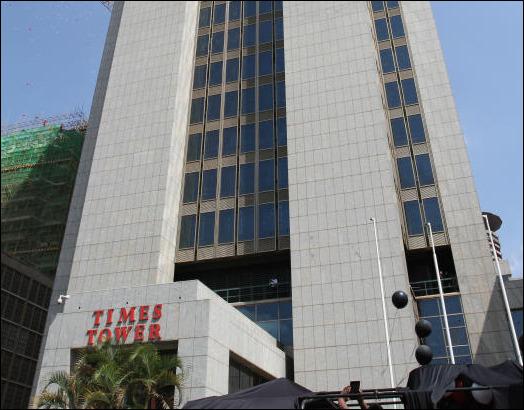- Africa’s new dawn: the rising role of digital and AI in agriculture
- Can Dangote Refinery Transform Africa Energy Ambition
- Gallup Survey: 80 per cent of Kenyan Workers Are Disengaged and Seek New Opportunities
- Madagascar Man Freed from 5KG Tumor After 15-Year Struggle
- How women in Africa are perceived and treated
- Sugar consumption in Kenya to Increase to 1.23 Million Tonnes
- Can Somalia and Turkey Oil deal Bring Change in Somaliland
- Remittances to Kenya dropped to $371.6 million in June, marking a six month low
Browsing: KRA
- Swiss authorities say SICPA was “criminally liable” for failing to prevent its staff from bribing foreign officials
- SICPA has been slapped with 91.5 million fine for bribing officials in Brazil, Colombia and Venezuela.
- The Swiss firm has been contracted by the Kenya Revenue Authority to supply tax stamps.
A Swiss firm contracted by Kenya Revenue Authority to supply tax stamps has been fined $91.5 million on graft claims. Security ink company SICPA has been ordered to pay the fine by Swiss Attorney General citing corporate criminal liability.
The Swiss Attorney General identified organisational deficiencies that saw SICPA staff bribe public officials in Brazil, Colombia, and Venezuela.
“Organisational deficiencies were particularly evident in the areas of corporate governance, risk management and compliance,” reads the press release by the Office of the Attorney General of Switzerland (OAG).
Ordered to pay a fine
“With the penalty order issued in accordance with Art. 102 …
- Safaricom and Nairobi City County have signed a partnership to digitise the county’s services and operations.
- Under the partnership, Safaricom will develop and support the “My Nairobi App” as part of the “My Nairobi” hub that provides digital services and citizen engagement.
- The platform offers a one-stop shop for businesses in the County where residents, and visitors, can access services with multiple functionalities including making payments.
Safaricom and Nairobi City County have signed a partnership to digitise the county’s services and operations. Under the partnership, Safaricom will develop and support the “My Nairobi App” as part of the “My Nairobi” hub that provides digital services and citizen engagement.
“This My Nairobi Hub will enable us to offer better services to the people of Nairobi. It offers a one-stop shop for businesses in the County where residents, and visitors, can access services with multiple functionalities including making payments. Residents of Nairobi …
Regressive taxation, bureaucracy, and the expense of regulatory compliance are cited in the Plan as the main obstacles to rescuing Kenya from the “economic hole” it is now in.
Examining and streamlining all business licences is the first step in the economic reform process, intending to cap overall licencing expenses at 1.5% of turnover fees.
As correctly stated in the Plan, passing an administrative burden law resembling the Reduction of Paperwork Act in the United States of America will guarantee that no company spends more than four person-hours per month on tax and regulatory compliance.
The ease and cost of conducting business in Kenya have remained critical barriers to the country’s economic growth.…
In the first six months of the year, Kenya’s food imports had increased to sh103.34 billion. The figures collected by the Kenya Revenue Authority (KRA) showed that the food imports were sh12.35 billion more than the amount spent in the same period in 2020.
According to data from the national treasury, import expenditure increased by 29 per cent in the third quarter of 2021. China is the most significant contributor of Kenyan imports accounting for 31.6 per cent of the total bill from the Asian continent.
This is the fastest growth in the food import bill since a 60 per cent jump recorded in 2016 when the bill stood at sh82.83 billion. The exponential increase has been linked to the growing popularity of digital trading, allowing retailers and consumers to order and ship food and other commodities directly.…
- KRA commenced the new financial year on an upward trajectory after surpassing its July – September 2021
- Customs & Border Control (C&BC) collected KSh 57.374 Billion against a set target of KSh 51.200 Billion
Kenya Revenue Authority (KRA) collected KSh154.383 Billion in the month of October 2021 against a target of KSh142.285 Billion, recording a performance of 108.5% and a growth of 23.2%.
This follows a similar positive performance of Quarter Two of the Financial Year 2021/22.
KRA commenced the new financial year on an upward trajectory after surpassing its (July-September 2021) target of KSh461.653 Billion by KSh15.053 Billion, recording a 30.0% growth.
Read: Diaspora remittances a lifeline to investments growth in Somalia
This implies that cumulatively KRA realized collections of KSh 631.090 billion for the period July – October 2021 against a target of KSh 603.939 billion, translating to a performance rate of 104.5%, a growth of 28.3% and …
Kenya revenue authorities formerly known as (KRA) has been one of the government agency programs in charge of collecting, accessing, and accounting for all taxes around the country, it started way back in 1995 by the national assembly. The Kenya revenue authorities headquarters is located at Times Tower, Haile Selassie Avenue in Kenya’s capital Nairobi.
In Kenya when one hears or comes across the name Kenya Revenue Authority (KRA), what automatically comes to mind immediately is tax. in other words KRA is mostly referred to as the taxman by Kenyans. it is also a facilitator of global trade.
Kenyans have always found themselves on the other side of the law most so students. Every individual and company in possession of a Personal Identification Number (PIN) should file their tax return at the end of the year with the collection agency which is the Kenya Revenue Authority.
Kenya operates a self-assessment …
The Kenya Revenue Authority (KRA) has received surveillance equipment worth more than US$378,000 (KShs 40 million) to support its trade facilitation initiatives and enhance security at key border points.
In a statement, the Authority says the equipment comprises an X-ray baggage scanner, a patrol boat, patrol vehicles, Raman spectrometers, and field test kits.
The equipment was procured by the United Nations Office for Project Services (UNOPS) from the Government of Japan in partnership with the Japan International Cooperation Agency (JICA) and World Customs Organization (WCO) as part of customs capacity building initiatives in Kenya.
According to KRA, the equipment will be used to detect dangerous or contraband items concealed in luggage, parcels and/or cargo as well as support in monitoring and detection of chemicals and other components used to manufacture improvised explosive devices (IEDs).
The equipment comes amid increasing global threats to security in the region that have prompted the …
Kenya Revenue Authority has reached a new record of revenue collection to hit Sh1.669 Trillion in the 2020/21 financial year, compared to Sh1.607 Trillion collected in FY 2019/20.
In a statement, the Authority’s Director-General Githii Mburu says that this is in spite of the challenging operating economic environment brought about by the COVID-19 Pandemic.
“Kenya Revenue Authority (KRA) has defied all odds to surpass its revenue target after eight (8) years, since FY 2013/14,” the Authority said.
The FY 2020/2021 revenue target as reflected in the 2021 Budget Policy Statement was Sh1.652 Trillion which KRA says it surpassed with a surplus of Sh16.808 Billion.
This represents a performance rate of 101 percent and revenue growth of 3.9 percent compared to the last Financial Year.
KRA says the performance is consistent with the prevailing economic indicators, especially the projected GDP growth of 0.6 percent in 2020.
During the period under review, …
Eight business associations representing the business community in Kenya have come together to call for the abolishment of the 1% minimum tax introduced by the government.
The new bill expected to take effect on 1st January next year was introduced through the Finance Bill, 2020 (the Bill).
The bill was tabled in the National Assembly for debate and approval on 6 May 2020. This was a departure from previous years where finance bills would be introduced to the National Assembly after the reading of the national budget in June. This change was necessitated by recent constitutional interpretations issued by the court which barred the government from collecting taxes before the relevant tax provisions are approved by the National Assembly, and a subsequent amendment to the Public Finance Management Act, 2012 which required that the Finance Act be enacted by 30 June.











